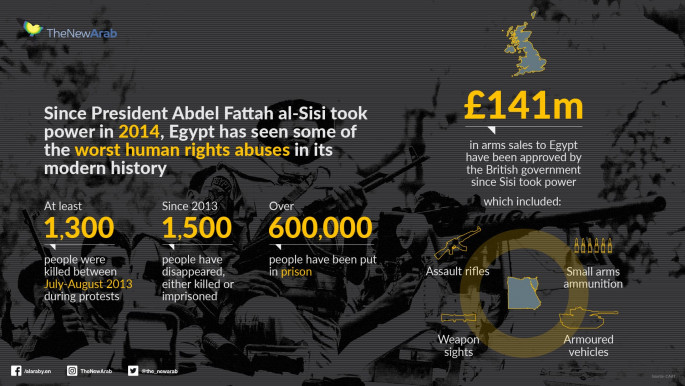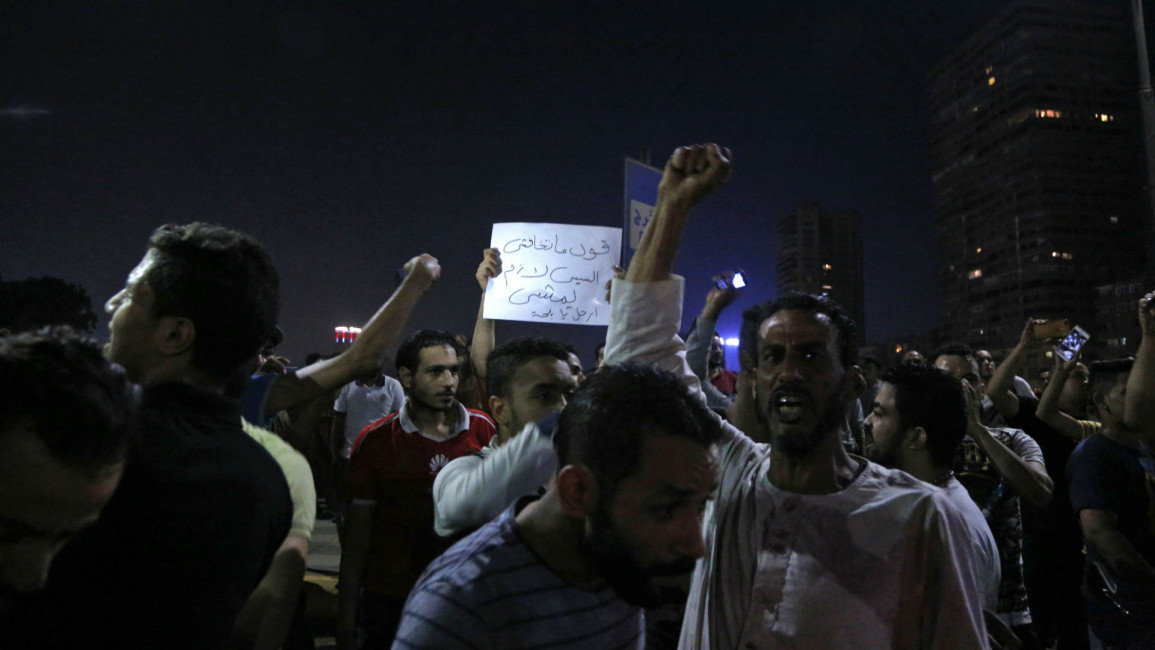Egypt admits to detaining, interrogating 1,000 people over 'Palacegate' protests against 'Sisi corruption'
Egypt admits to detaining, interrogating 1,000 people over 'Palacegate' protests against 'Sisi corruption'
The Egyptian Centre for Economic and Social Rights has documented more than 2,000 arrests since Friday.
3 min read
At least seven foreign citizens have also been arrested [Getty]
Egypt's Attorney General has claimed the public prosecution has detained "no more than 1,000 people" in relation to protests that broke out against President Abdel Fattah al-Sisi's rule last week.
In a statement released on Thursday night, Attorney General Hamada al-Sawi said the public prosecution had questioned "no more than 1,000 people", noting that the defendants had been interrogated in the presence of a lawyer.
The government's first official statement on the protests clashes with claims made by the Egyptian Centre for Economic and Social Rights (ECESR), an NGO which has been documenting the detention of civilians in relation to the demonstrations.
At least 2,043 people have been detained since Friday according to ECESR. Around half of those arrested have been "forcibly dissappeared", according to the NGO, making it unlikely the suspects have been in communication with a lawyer.
The government's first official statement on the protests clashes with claims made by the Egyptian Centre for Economic and Social Rights (ECESR), an NGO which has been documenting the detention of civilians in relation to the demonstrations.
At least 2,043 people have been detained since Friday according to ECESR. Around half of those arrested have been "forcibly dissappeared", according to the NGO, making it unlikely the suspects have been in communication with a lawyer.
Among those arrested are at least seven foreign citizens, several of whom have made "confessions" which have been broadcasted on Egyptian television.
Waleed Abdulrahman Hassan Suleiman, a 22-year-old Sudanese student who came to Cairo to study German, was pictured "confessing" to belonging to the Muslim Brotherhood, an outlawed Islamist group deemed a terrorist group by the Egyptian state.
His detention has caused uproar in Sudan, where his family has denied the claims that he is a member of the banned group and participated in the anti-government protests.
 |
| [Click to enlarge] |
Opposition activists have accused the Sisi regime of arbitary arrests as part of a mass campaign to supress future protests and quash dissent.
The authorities have accused of illegally conducting random searches of the mobile phones of pedestrians in central Cairo to find "anti-Sisi" material and social media accounts.
The Attorney General admitted that the authorities have interrogated the social media presence of those detained.
Sawi claimed that some of the defendants had admitted to involvement in the protests but had said they were spurred to participate through "deceptive" claims made on social media.
Read more: Egypt awaits: Will Friday see a million Egyptians march against Sisi?
The public prosecution will take action to identify the users and administrators of social media accounts behind such claims, the Attorney General said.
The protests broke out in Cairo, Suez, Damietta and other Egyptian cities on Friday and Saturday last month after videos alleging endemic corruption in the Sisi regime and military went viral earlier this month.
|
|
Mohamed Ali, the former military contractor behind the videos, alleges that Sisi and the military appropriated millions of dollars worth of public funds to build lavish villas and palaces, while at least a third of the Egyptian population languishes in poverty.
Sisi has admitted to building the palaces, claiming the construction was for the benefit of Egypt, and has said he will build more in the future.
According to the Attorney General's statement, some of the defendants "confessed" their "loyalty" to the Muslim Brotherhood.
State media has accused the outlawed group of inciting protests.
Other defendants allegedly said they were "incited" to take videos or photos of demonstrations by suspicious "unknown" figures.
Dutch citizen Pieter Bas appeared in a televised confession on Tuesday, admitting to flying a drone from the rooftop of his Cairo hotel to take pictures.
State-affiliated television channel MBC Masr broadcast the drone's footage, which appeared to be aerial videos of the capital not including any footage of the protests.
Jordanian tourists Thaer Hussam Fehmi Matar and Abdelrahman Ali Mohammad Hussein also appeared on Egyptian television, "confessing" to "incitement against the state of Egypt", as well as taking videos of the protests and posting them on Facebook.
Also among the detainees are award-winning human rights lawyer Mahienour el-Massry, former Constitution Party head Khaled Dawoud, and prominent political scientists Hazem Hosny and Hassan Nafaa.
Follow us on Twitter: @the_newarab



